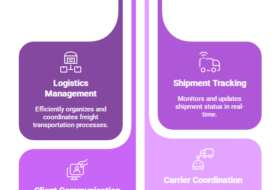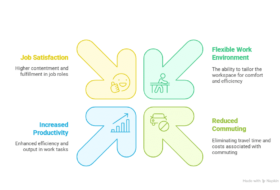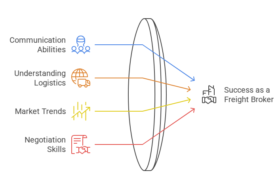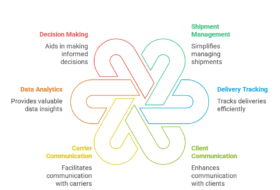Transportation Brokerage The transportation industry boasts many lucrative job opportunities. One of the best is in transportation brokerage. Careers in transportation brokerage have become an essential part of the industry as a whole. Transportation brokers connect carriers with shippers and receivers so the domestic and international transfer of goods goes off without a hitch.
Freight Brokers
Freight brokers act as liaisons between carriers and shippers to ensure safe and proper transfer of goods. The Federal Motor Carrier Safety Administration (FMCSA) regulates how freight brokers become licensed and eligible to work. To obtain FMCSA approval, you will need to complete and send in two forms: the OP-1 and the BOC-3, available at your nearest field office. The OP-1 form gives you the authority to become a freight broker. The BOC-3 qualifies you as a processing agent. Both forms carry filing fees, so check with your field office before submitting as fees are always subject to change. Also, obtain a Surety Bond or Trust Fund from a quality bank or bonding company.
Before you decide whether or not freight brokerage is the right career for you, make sure you have the necessary sales and marketing skills to prospect for new clients. Also, you will need to learn how to rate loads. The final price tag of a load changes depending on the point of origin and the distance the load will travel. Knowing what to expect puts you in a better position to negotiate with carriers for the best rate. For the FMCSA field office nearest you, visit the official website.
Freight Agents
Freight agents operate in the same capacity as freight brokers, though the role of a freight agent is more as the apprentice. You will not make as much money as a freight broker, but you will also assume none of the risk. Freight agents are not required to obtain a certain level of education, though most reputable companies prefer to work with individuals who have college degrees. Freight brokers need to know you are capable of meeting the requirements of the business. To become a freight agent, submit your application to companies and demonstrate a knowledge of the business.
Customs Brokers
In addition to domestic transportation brokerage careers, customs brokers handle the transport of freight between importers and exporters internationally. A customs broker prepares appropriate documents and handles all electronic submissions. He pays all duties, excises, and taxes, on behalf of his clients. Throughout the process, the customs broker establishes and maintains communication between governmental agencies and the importer and exporter. To become a customs broker, you must pass the Customs Broker License Examination, administered by the office of Customs and Border Protection (CBP). The test is open-book and consists of 80 multiple choice questions. Additionally, you will need to complete an application and submit with appropriate fees. For more information, contact the CBP port nearest you.







